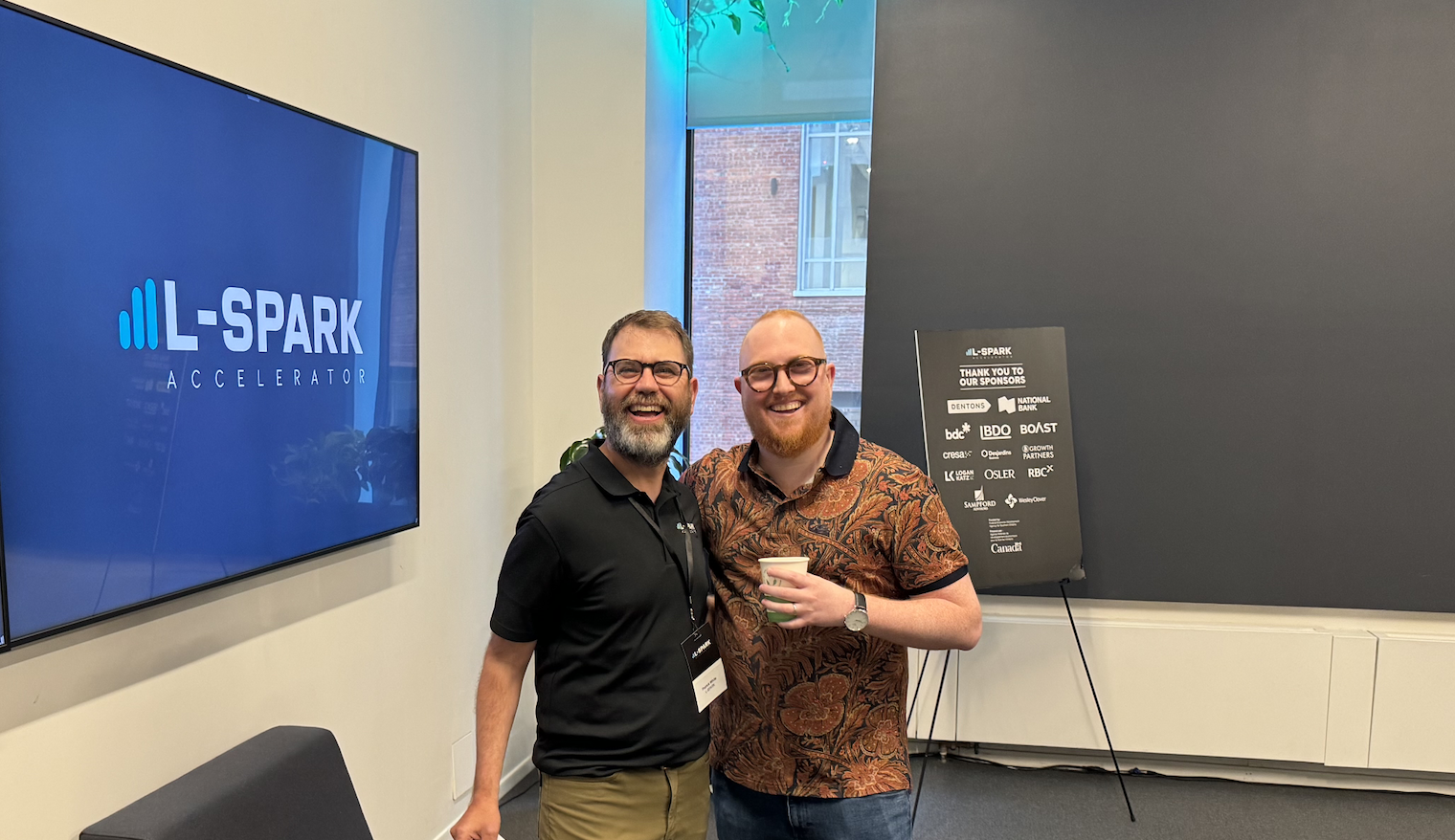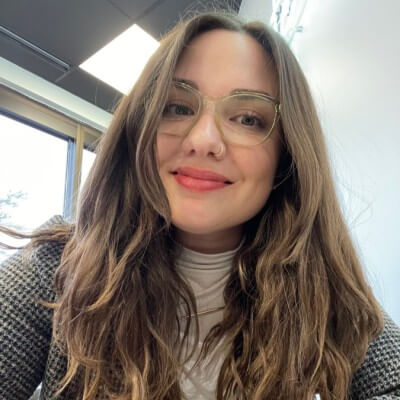Building a company is hard work, and the path to success is often filled with challenges.
In our recent chat with L-SPARK Alumni, Étienne Mérineau Co-Founder of Heyday (acquired by Hootsuite) we explore the strategies, insights, and experiences that drove their startup success, and what life after acquisition looks like.
Let’s dive in:
How was your product born? What did that ideation process look like for you? Looking back now, is there anything you would have done differently?
“Back in 2016, it was clear that we were at an inflection point in technology and consumer habits. Text messaging was starting to emerge as the main communication channel between people and their friends, family and colleagues.
The insight was this: It’s only a matter of time before consumers expect to do the same with businesses. Every revolution in communication leads to a revolution in commerce. It felt like e-commerce and social media would usher in a new era of 1:1 communication between consumers and businesses.
But the problem was and still is: How can you manage dozens of omnichannel touchpoints and thousands of customer messages and requests at scale?
AI + automation was the answer. By taking redundant queries automating them, and only escalating higher-value or more complex queries to human teams, we could achieve faster response time and better customer experiences that convert and retain customers at scale.
So we set out to build a Conversational AI company specializing in customer experience management, from first click to checkout (i.e. encompassing the full customer journey from marketing to sales to customer support).”
What was the greatest challenge and most impactful lesson you learned throughout the process of scaling your company to acquisition?
“As a non-technical founder, I realized how difficult, long and expensive software development is. I thought raising $2M was a lot of money. I quickly realized we were going to war with a slingshot vs. bigger companies who had sizable war chest and a global presence.
On the flipside, go-to-market is also a core challenge for startups. It’s easy to get intoxicated with possibilities. Many industries could potentially be buyers of your technology. So “focus” is a challenge but also your best friend. That’s how you can avoid falling into the “spray and pray” trap where you burn a lot of money aimlessly.
Although the future seemed clear to us, the good adage is true: “the future is not evenly distributed” and it took awhile before our target customers understood that they needed us. Somehow we got lucky with one of the worst world events in recent memory. COVID was a disaster but proved to be an accelerant for us. Overnight, it drastically accelerated the pace of digital transformation in retail and propelled our solution from “nice-to-have” to “must-have”. That was a turning point for us.”
Expanding your team as you scale is such a pivotal part of growth – what advice would you give to startups currently looking at their next (or first) hire?
“Startups tend to build the plane while flying so it’s hard to stop and be intentional about things. The most important thing in a startup is the team. So building a rock solid culture and team is often the difference between winning and losing in a tough market.
The thing with culture is that you either intentionally design it and nurture it, or it will design itself. As you scale, small things become big things. For example, we set out to create a culture of ownership from day one. To walk the talk, we made every new hire a shareholder of the company. It would have been very hard for us to wake up 4-5 years later and try to enforce a core value of “ownership” in every new hire if we hadn’t designed our culture intentionally to reflect this core value.
It wouldn’t matter much at 10-12 employees because these first hires are entrepreneurial by default. But as you scale, you need this value system to be consistently reinforced and embedded in everything you do for it to scale sustainably.
What’s true for culture is true for everything else. You need a playbook in the way you advertise job postings, the way you recruit and interview prospective hires and the way you onboard and track new hire performance. This can’t be an afterthought. And having a solid HR partner in house is the key to success.”
What would you say is the key ingredient for startup success?
“A lot of people talk about the team, the idea, the space, etc. Of course these are all very important things to consider because great teams create great products and great products create great businesses in the end.
But I’ve found the core ingredient is Velocity.
Teams that move faster fail faster, learn faster and in the end these baby steps compound to make you win faster.
At Heyday, we were not the most talented team. We were not the most capitalized either (if anything we raised too little capital). What made us a humble success story in the end was our work ethic, grit and the speed at which we executed. We were mostly wrong most of the time but we learned so fast that we found our answers faster, which in the end made us win.
Progress over perfection. You can’t know what you can’t see so go out there, play in traffic, get hit, learn from it and then you’ll compound this micro learnings into the winning recipe. Velocity becomes part of your culture and an organizational muscle over time. While bigger companies with bigger war chests get stuck in analysis paralysis, speed becomes your greatest ally in building a successful startup that shakes up the status quo.”
What does it feel like post-acquisiton? Is there anything about the process or milestone that’s different than what you thought it would be? Advice for founders currently in the grind and working towards that moment?
“I’ve spoken with many entrepreneurs who have gone through exits. And it’s always a bit bittersweet. One one hand it’s a life changing event and the ultimate prize you’ve been envisioning and fighting for your entire life as an entrepreneur. So you should be celebrating… on paper. On the other hand, there’s a bit of a mourning phase where you start letting go of ownership and even losing your sense of purpose sometimes. And this can be very hard for entrepreneurs.
Your startup was your baby and at the centre of your life and thoughts 24-7 all year round for years if not for decades. Detaching yourself and your identity from it is an emotional journey and transition in itself.
To soften the blow of the inevitable post-acquisition blues, it’s key to 1. be highly intentional about who you are selling to and why and 2. Prepare mentally to embrace your new role as a new steppingstone and learning experience.
I always say you need the 3 V’s to align to have a successful acquisition: Vision, Values and Valuation. If you get these 3, you have a deal. If you align with the buyer on vision and values, you will most likely have a successful integration of your product and team inside the bigger corporation and that will sustain the sense of purpose of the team. Plus, if the valuation is advantageous, you will see your work and the work of your team be rewarded accordingly, which is the most favorable outcome if you are in a position to maximize it.
That said, there is a caveat to valuation. The terms are equally important. For example, you’d rather have a lower valuation with limited handcuffs and earnouts vs. a higher valuation that depends on unachievable earnouts that can have the reverse effect of demotivating the team. So having the right investment banker and legal counsel by your side during the negotiation and due diligence process is the key to post-acquisition success too.
Today, Étienne is a close member of the L-SPARK network, and also serves as GP at Telegraph Capital, giving back to the startup ecosystem and helping more founders find their startup success. Read more about his journey here.
Want to be a success story? L-SPARK is always accapeting applications for our next cohort – could you be part of it?




